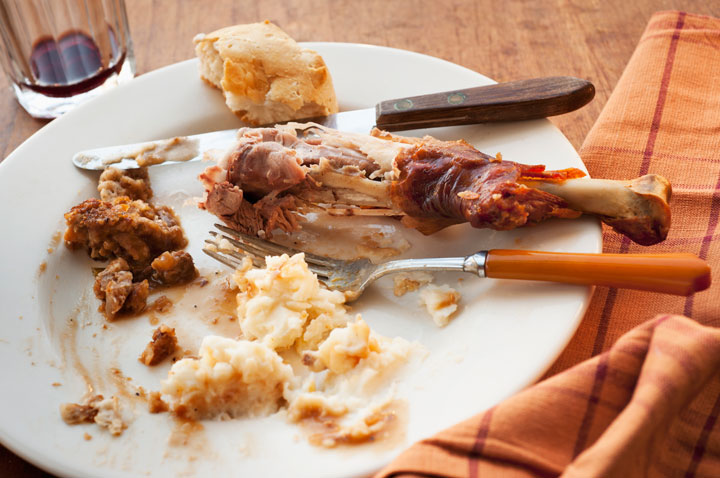Thanksgiving, more than maybe any other holiday, is about food: a turkey, potatoes, vegetables, wine, dessert and more.

And many of us end up eating much more than usual, then collapsing exhausted on the couch to digest.
Massively overeating isn’t good for us, obviously, but overindulging at one meal isn’t likely to have more long-term health effects than an upset tummy, according to registered dietitian Susan Macfarlane.
“One day of eating is just not enough to set you back to where you were on a health journey or losing weight.”
Many people build up the holiday in their minds, she said, carefully planning out foods they can and can’t eat and exactly how much to eat — only to find that these plans go out the window when someone opens another bottle of wine or offers a second slice of pie.
Then the next day, they feel guilty for having had too much. Registered dietitian Andrea D’Ambrosio said a lot of her clients come in after the holiday feeling defeated, saying, “’OK, Thanksgiving, I totally overate and it’s all my fault.’”
This can lead to people feeling that they’ve completely ruined their diets, and abandoning them altogether until the new year, Macfarlane said.
WATCH: Ready for Thanksgiving dinner? Here’s what happens to your stomach after a big meal

This is part of what D’Ambrosio calls the “all-or-nothing” mentality, where people strive for perfection — which is unattainable — and then when they fail, swing back the other way to overindulgence.
What matters isn’t so much a single meal, but your healthy eating practices day to day, Macfarlane said.
“Thanksgiving is not the problem. It’s all the days in between Thanksgivings that are the issue.”
Both Macfarlane and D’Ambrosio recommend taking some of the pressure off, and approaching Thanksgiving like you would any other meal.
That means not saving up your calories for the meal, which will just leave you hungry and prone to eating even more at dinner, Macfarlane said. Eating a normal breakfast and lunch like you would any other day will help. So would dividing your plate into half vegetables, one quarter starch and one quarter protein — the same as she recommends for any meal.
D’Ambrosio recommends remaining mindful as you eat your turkey, and noticing when you start feeling full, and giving yourself permission to stop or say no if you’re too full to eat more.
You should also ease up on the judgment, she said. Don’t separate foods into good and bad. Rather than saying that the mashed potatoes are unhealthy, you can enjoy them for what they are — savoury and creamy. And if you want more and you’re still hungry, that’s OK. Taking away some of the negative feelings will make you less likely, not more, to overeat, she said.
“Even if you overeat, we all do it, I even do it on occasion, you just notice, ‘OK, that was way too much. I don’t feel well. I will take notice of this feeling for next time.’”
In the days after, just go back to your regular healthy eating habits and don’t try to compensate by eating less, Macfarlane said. That will only contribute to the cycle of overeating and undereating. And if you have leftovers in your fridge, don’t feel pressured to eat them if you don’t want to.
“It’s totally OK to throw out leftovers.”
Bottom line: if you eat too much Thanksgiving dinner, it’s not going to cause irreparable damage to your healthy eating routine for the rest of the year, she said.
“It’s like throwing a glass of water in the ocean. In the grand scheme of things, with your weight and with your health, it’s not going to do anything.”


Comments